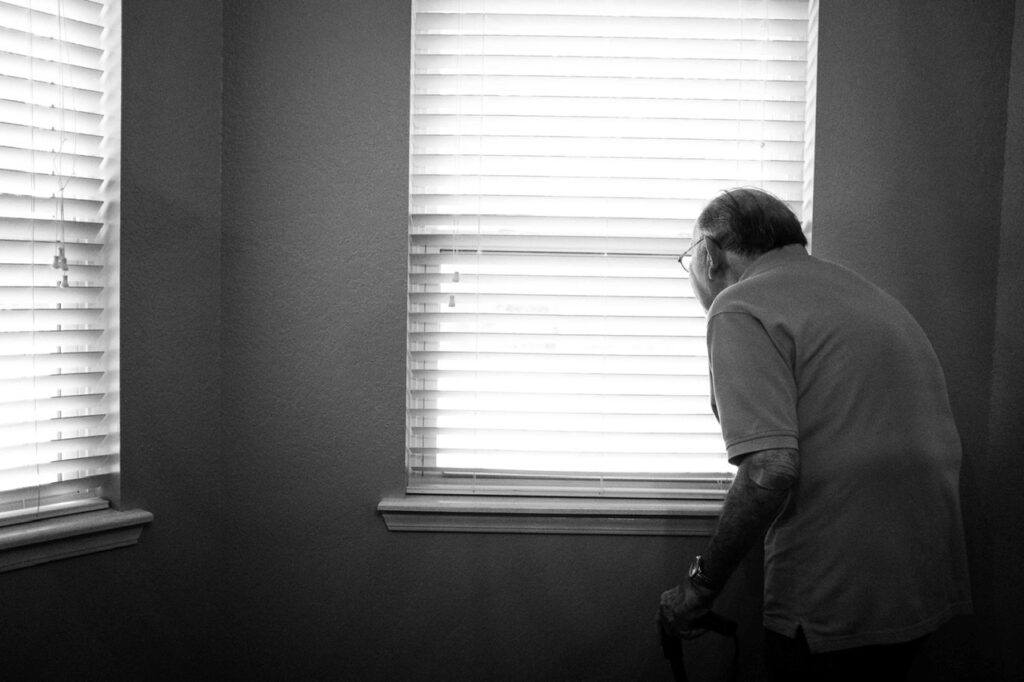In Question Time, Prime Minister Scott Morrison made an unfortunate but revealing statement about our attitudes to aged care. He said: “For those of us who have had to make decisions about putting our own family, our own parents, into aged care, we have known that when we’ve done that we are putting them into pre-palliative care.”

Earlier in the aged care Covid crisis, Victorian Premier Daniel Andrews said: “I would not let my mum be in some of these places, I just wouldn’t.’’
What these statements reveal is that, even with the best of intentions, we very easily slip into making decisions for our parents when they need care and support – and that we see residential aged care as the place we send them to die.
Developing serious impairments and disabilities has an enormous impact on how we see ourselves and our lives. It also affects how our families and friends see us.
It is easy to lose sight of the person and their choices and aspirations when people develop serious disabilities. This is particularly true when they are older and their disabilities affect their capacity to make decisions.
When older people develop serious disabilities, others, including family members and health care professionals, are often quick to see this as an inevitable path to death. Too often we make decisions for them, without considering their rights and aspirations, and without considering what it means to take those things away from them.
Often families focus on safe, comfortable care, but not on older people’s dignity and how they might want to live to pursue their interests, goals, and preferences.
Overwhelmingly, Australians would prefer to grow old at home – to get the support and care they need to continue to live at home and in the community. Yet about 200,000 older Australians live in residential aged care facilities.
The reality is that many of these older people will live for years in residential care, and yet for many it is not their preferred home.
It is true that the overwhelming majority of residents in aged care facilities will die there – about a quarter within six months. But nearly half will live in there for more than two years before they do so.
The community has rightly been appalled by revelations of poor-quality basic care (and sometimes even neglect and abuse) in residential aged care and, more recently during the pandemic, of the lack of infection control.
But more insidiously, for many, residential care robs people of their dignity and meaning in life. They are patronised, isolated, lonely and bored. Their choices have been taken away and they have been devalued and forgotten.
Of course high-quality personal and nursing care is important, but that is no substitute for supporting older people to find dignity and meaning in their lives when they have serious disabilities.
If we are serious about older people’s rights, we need to stop describing residential care as a place we ‘put’ people while we wait for them to die.
Instead, we should see aged care as providing the support older people need to continue to living meaningfully when they develop serious impairments and disabilities.
Older people need to have choices about the care and support they need. Most will choose home-based care. But at the moment there are about 100,000 Australians on the waiting list for Home Care Packages, and many wait for more than a year to get services that are allocated to them.
If people do choose residential care, they should have residential options that allow them to live with dignity and respect so they can continue to engage with their family and friends and participate in the community.
Professor Hal Swerissen is a Fellow at the Grattan Institute. He has an extensive and distinguished record of achievement in health policy research and analysis. He has held senior executive positions as Pro Vice Chancellor (Regional) and Executive Dean of Health Sciences at La Trobe University. He has been a senior advisor to Commonwealth and State governments and has conducted a range of policy and research studies and inquiries. He has published more than 100 academic papers and research reports.

Comments
5 responses to “Aged care should not be ‘pre-palliative care’ as Scott Morrison suggests”
Good article. Makes me want to show it to my aging Mum, (who is desperately afraid of being confined in a nursing home).
Since being lucky enough to be her primary carer, I have realised that all the aged are not just “old people” but have a wealth of life experience to share, especially if one is a willing listener!
I cannot abide the constant excuse that “aged care is so expensive”. It should be! We owe the aged a great debt. Let’s not discount them as being no longer useful, due to their age or inability to perform “useful” work.
Sharing their experiences is very useful work.
And to think, that a profit can be made out of the aged’s mysery?? Really? Discusting!
This seems an issue with 2 dimensions. Money and philosophy.
It takes a lot of money to look after old people who cannot look entirely after themselves anymore. The LNP’s view is that it should spend as little money as possible on what it would consider non-economic assets.
The ALP’s position is less clear although it tends to a more social and humanitarian attitude.
The philosophical view of the LNP is encapsulated in Hockey’s once statement: “They don’t have enough money? Let them find a better job.” or more in Australian vernacular: “FY, I’m alright Jack”.
The ALP seems to have a more social approach but much of this has been blunted by the lack of allocated money, as tax increases seem impossible to secure.
Interesting how the most social policy on this is from the Greens, but hardly ever vented.
We obviously harvest what we sow.
Aged care should not be ‘pre-palliative care’ Yes definitely should not be that! But the statement presents itself because the wearer is looking through a particular economic lens.
Neoliberalism Morrison’s bed time story has disembedded economics from its social context.
The financial takeover of government policy the business plan of asset stripping and economy wide austerity.
“Aged care should not be ‘pre-palliative care’ as Scott Morrison suggests” unless, its your parents?
Yes. Aged care should provide people who need extra support to make the most of their remaining years, not be somewhere they are ‘parked’ to wait to die.